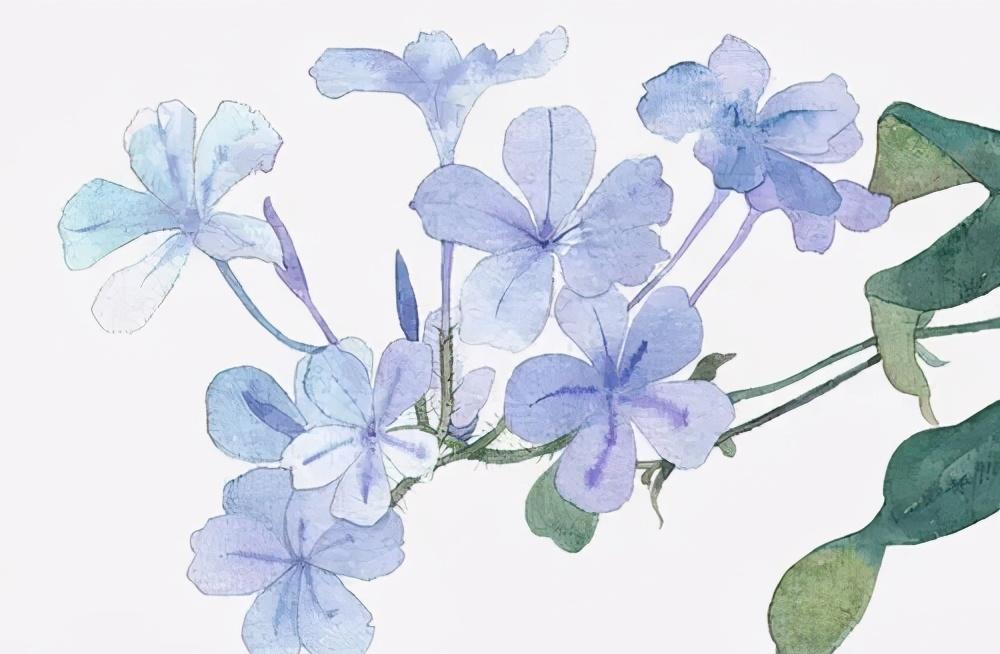She is there
Clove-like color
Clove-like fragrance
Lilac-like melancholy
Lament in the rain
Mourning and wandering
——Dai Wangshu, "Rain Lane"
When we think of lilacs, the first thing we think of should be the poet Dai Wangshu's "Rain Alley". This modern poem carries the thoughts of many people. In the poem, the lilac is used to symbolize the girl, expressing the same complex as the lilac.
And the lilac itself has a beautiful legend, through the ages, cloves are not unfamiliar in our historical memory. Some people say that cloves are both "sad" emotions, wild is "hope" and "rebirth". How should this be interpreted?

The history of cloves is sad
During the Ming Dynasty, Peng Dayi's "Mountain Hall Examination" recorded: "Jiangnan people call lilacs a hundred knotted flowers. "But in reality, when the lilacs bloom, they do not converge, and the fine flowers are gathered into a conical inflorescence, and at the same time bloom and bloom." Therefore, many people will wonder, how can such a vigorous lilac flower become a symbol of "grievance"?
Lilac, also known as lilac genus, is widely distributed in southeastern Europe, Japan, China, etc., is a traditional ornamental flower, also known as baijie, lover, ruyi, thyme, chicken tongue and so on.
The lilac flowers are weak and give people the feeling of wanting to be exhausted. Wang Shipeng of the Song Dynasty called Lilac "a sad and dry knot, as if remembering the Lord of Jiangnan". Ancient poets therefore used lilac flowers with buds to hold on, metaphorically melancholy knotted, difficult to dispel, used to write about the deep parting and hatred between husband and wife, lover or friend.
"Lilac sorrow" in ancient poetry
Niu Yu "Grateful For More" "Since Nampo farewell, I have seen the lilac knot." ”
Yin Yan's "He Manzi" "wants to express the taste of wounds and feelings, and the cloves are knotted in the heart." ”
Du Fu's "Four Songs of Jiangtou" "The lilac body is weak, and the branches are still mated." ”
Li Shangyin's "Gift" "Basho does not show the lilac knot, and the same spring wind is worried." ”
Qian Wei played "Untitled" "Acacia does not test the lilac knot, only to be desolate on the candle room." ”
Interpreting cloves from a humanistic point of view cannot be separated from a kind of melancholy and a feeling of depression. The historical texture of the lilac, "sad knot" is the core.
Lilac, a noble color that is extremely difficult to control
Lilac purple, derived from lilac, it blooms white or purple flowers, implying innocence, modest beauty, and power in calm. This color is extremely difficult to control, but once properly controlled, the noble atmosphere overflows. Just like at the Spring Festival Gala, a piece of purple is red, and we only remember a touch of Lilac Purple of Faye Wong.
Her long purple dress is specially customized and fairy! That night won the critical eyes of the nationals.
In Europe, purple is also a symbol of wealth and royalty, such as the purple suit often worn by queens of England. Abroad, lilacs also have the title of flower of heaven, which symbolizes brilliance and hope.
In France, "when the lilacs bloom" means when the climate is at its best. The lucky flower for people whose birthday is May 17 or June 12 is lilac. In the West, the flower symbolizes "the innocence, first love and humility of young people".
Reborn – the bright smile of clove essential oil
The noble fragrance of cloves has been cherished since ancient times. In the Han Dynasty, palace ministers liked to cover up bad breath with cloves in their mouths. Coincidentally, doctors in Europe once fought off the plague by wearing cloves in their mouths.
The production of clove essential oil is quite complicated. At the end of summer, it is picked by hand once and again in the winter, drying the buds until they turn brown. These buds are left intact and the clove essential oil is extracted by steam distillation.
The main chemical component of clove essential oil is eugenol, and eugenol is also the reason for the strong aroma of clove essential oil. As a result, its smell is well known and can often be smelled in dentist clinics. Moreover, one of the most famous uses of clove essential oil is to relieve toothache.
The benefits of clove essential oil are truly impressive, from improving blood circulation to reducing inflammation, from relieving acne to promoting gum health.
For centuries, clove essential oil has received attention for its ability to prevent infection, and in any epidemic period, clove essential oil can be dripped into a diffuser or humidifier in the home to disinfect the air. In winter, cloves, cinnamon, and grapefruit can be mixed for aromatherapy, which can prevent infectious diseases in winter.